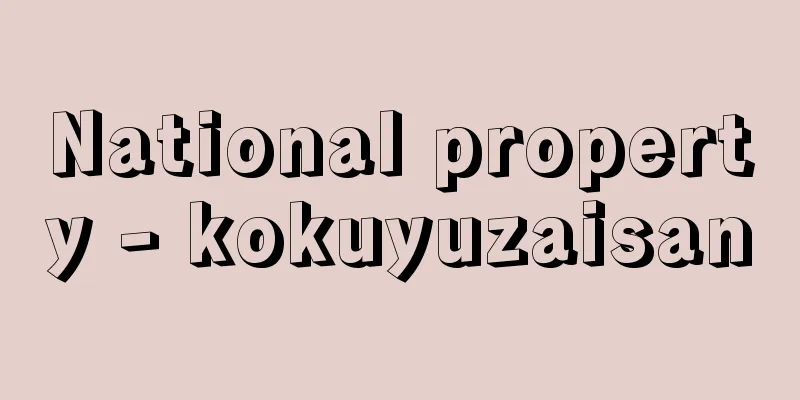National property - kokuyuzaisan

|
In a broad sense, it refers to all property owned by the state (real estate, movable property, and rights), but in a narrow sense, it refers to property owned by the state that is defined by the National Property Act (Act No. 73 of 1948), namely, real estate such as land and buildings, movable property such as ships and aircraft, usufruct rights such as surface rights and easements, intangible property rights such as patents and copyrights, and securities. The management and disposal of cash, goods, and credits that do not fall under the narrow definition of national property are stipulated in the Accounting Act, the Goods Management Act, and the Act on Management, etc. of National Credits, respectively. In the narrow sense, state property is classified into administrative property and ordinary property. Administrative property is property used for public purposes by the state, and is divided into public property, public property, property for the Imperial Household, and property for corporate use. Ordinary property refers to all property other than administrative property. The Minister of Finance has overall control over national assets, but administrative assets are managed by the heads of each ministry and agency, while ordinary assets are managed and disposed of by the Minister of Finance. The duty of the Minister of Finance, who has overall control over national assets, is to unify and coordinate the affairs of management and disposal of national assets. To this end, the Minister of Finance may, when he deems it necessary, request documents or reports on the status of national assets under his jurisdiction from the heads of each ministry and agency, conduct on-site audits, or request changes to use, abolition of use, transfer of jurisdiction, or other necessary measures in order to ensure the proper management and disposal of national assets. The Ministry of Finance has a National Property Subcommittee of the Financial System Council as an advisory body to the Minister of Finance, and each Finance Bureau has a Local National Property Council as an advisory body to the Directors of the Finance Bureaus. The National Property Subcommittee is responsible for investigating and deliberating the basic policy for the management and disposal of national assets and other important matters in response to consultations from the Minister of Finance, and for making recommendations to the Minister of Finance on matters that he deems necessary. The use or profit from administrative property may be permitted to the extent that it does not interfere with the use or purpose of the property, but it may not be leased, exchanged, sold, transferred, made the subject of contributions, or private rights may not be established. Furthermore, the provisions of the Land Lease Law and the House Lease Law do not apply when administrative property is used or profited from with permission. In contrast, ordinary property is not used for public purposes, but is, so to speak, a private source of revenue for the state, so it may be leased, exchanged, sold, transferred, or private rights may be established, and it may also be made the subject of contributions if provided for by law. [Shimada Shigeru] [Reference] | | | | | |Source: Shogakukan Encyclopedia Nipponica About Encyclopedia Nipponica Information | Legend |
|
広義には、国の所有するいっさいの財産(不動産、動産および権利)をさすが、狭義には、国の所有する財産のうち、国有財産法(昭和23年法律73号)が定める財産、すなわち、土地・建物などの不動産、船舶・航空機などの動産、地上権・地役権などの用益物権、特許権・著作権などの無体財産権および有価証券などの財産を意味する。狭義の国有財産に該当しない現金、物品および債権の管理・処分については、それぞれ、会計法、物品管理法、および「国の債権の管理等に関する法律」において規定されている。 狭義の国有財産は、行政財産と普通財産とに分類される。行政財産は、国において公の目的のために供用される財産であり、公用財産、公共用財産、皇室用財産および企業用財産に区別される。普通財産は、この行政財産以外のいっさいの財産をいう。 国有財産の総轄は財務大臣が行うが、行政財産については各省各庁の長が管理し、普通財産については財務大臣が管理・処分する。国有財産を総轄する財務大臣の職務は、国有財産の管理および処分の事務を統一、調整することにある。そのために、財務大臣は、国有財産の管理および処分の適正を期するため、必要があると認めるときは、各省各庁の長に対し、その所管に属する国有財産について、その状況に関する資料もしくは報告を求め、実地監査をし、または用途の変更、用途の廃止、所管換え、その他必要な措置を求めることができる。財務大臣の諮問機関として財務省に財政制度等審議会国有財産分科会が置かれ、財務局長の諮問機関として財務局ごとに国有財産地方審議会が置かれている。国有財産分科会は、財務大臣の諮問に応じ、国有財産の管理および処分についての基本方針その他重要事項を調査審議し、必要と認める事項を財務大臣に建議することを職務とする。 行政財産は、その用途または目的を妨げない限度において、その使用または収益を許可することができるが、これを貸し付け、交換し、売り払い、譲与し、もしくは出資の目的とし、または私権を設定することはできない。また、許可を受けて行政財産を使用または収益する場合にも、借地法および借家法の規定は適用されない。これに対して普通財産の場合は、公の目的のために供用されるものではなく、国のいわば私的な財源となるものであるから、貸し付け、交換し、売り払い、譲与し、またはこれに私権を設定することができ、法律で定めた場合は、これを出資の目的とすることもできる。 [島田 茂] [参照項目] | | | | | |出典 小学館 日本大百科全書(ニッポニカ)日本大百科全書(ニッポニカ)について 情報 | 凡例 |
>>: Nationalization (English spelling)
Recommend
Rancagua (English spelling)
A city in central Chile. It is located about 70 km...
Vibration induced white finger
...In Japan, this symptom gradually appeared afte...
Shin Jaehyo (English spelling)
[Born] 12th year of Sunjo (1812), North Jeolla Pro...
Parties to a lawsuit
A person who, in his/her own name, seeks the exer...
Macedonski, A.
...Realist fiction reached a high level through t...
Okugosho - Okugosho
〘Noun〙 A job title in the Edo Shogunate. A page wh...
Farm tools - Nougu
Agricultural tools are simple tools used in farmi...
London Naval Conference
From January to April 1930, the five nations of th...
João VI
1767‐1826 King of Portugal. Reigned 1816-26. Son o...
Charcoal labor - Tanro
Its official name is the Japan Coal Mine Workers&#...
Panel heating
Radiant heating. A heating method in which hot wat...
Guard Ishida - Morie Ishida
...After the Asakusa Opera era ended, this light ...
Liberal Arts
A general term for general education subjects. Som...
Hinoki (Chamaecyparis obtusa)
An evergreen tall tree of the cypress family. It g...
Inference - Inkyo
〘 noun 〙 To quote something as evidence or proof. ...





![Ina [town] - Ina](/upload/images/67caef7c3df3b.webp)



